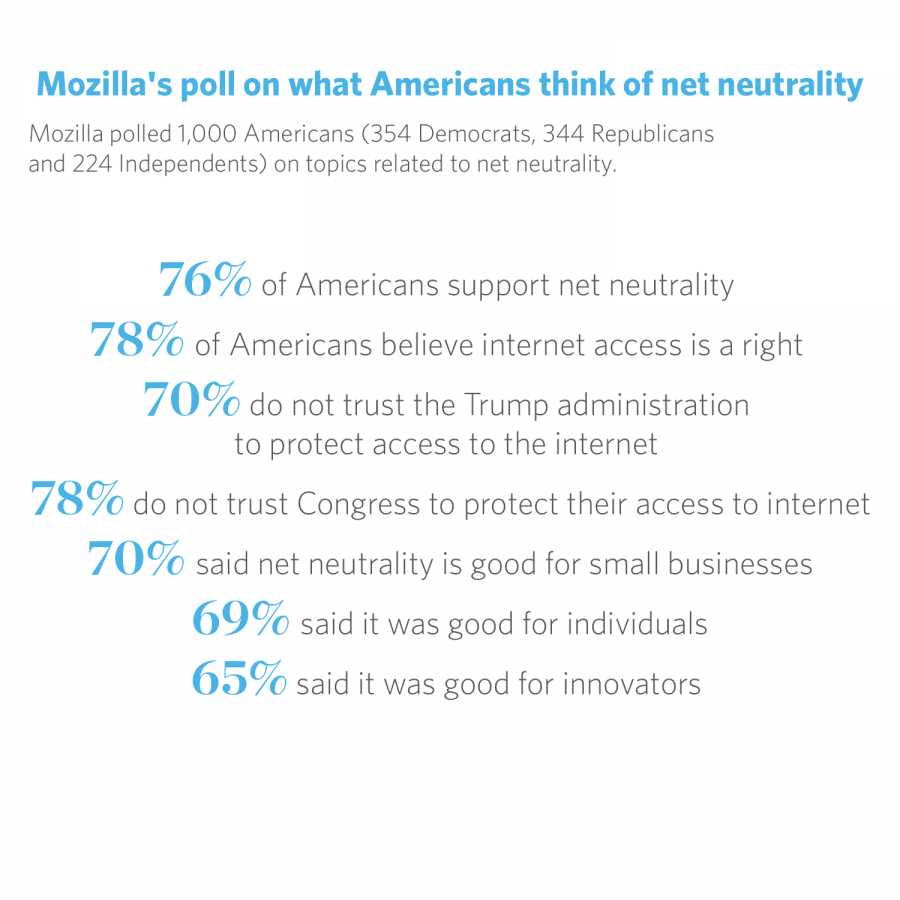Professors give input on net neutrality
Source: Mozilla
December 11, 2017
With the looming Federal Communications Commission’s vote on net neutrality currently planned for Dec. 14, University professors are reflecting on possible ramifications of the repeal.
Net neutrality is the idea that all internet traffic must be treated equally. Without it, internet service providers, or ISPs, could separate the internet into fast and slow lanes, according to Fortune Magazine.
Vishal Sachdev, professor in Business, said the main factor in deciding what content gets shared or viewed now depends on its quality and users.
“When you repeal those rules, you’re effectively saying that money talks,” he said.
A potential scenario without net neutrality could be a company partnering with an ISP to increase the speed of their website at the expense of others. Geoffrey Challen, professor in computer science, discussed a hypothetical situation where Google Plus could team up with Comcast, an ISP, so access to Google Plus would be faster than Facebook, its competitor.
Get The Daily Illini in your inbox!
Both Challen and Sachdev said they believe the repeal of net neutrality will have little impact on students in college, especially here because the University provides internet.
“I would be very surprised if universities would enact any of the more problematic violations of net neutrality that the people in favor of net neutrality are worried about,” Challen said.
However, Challen and Sachdev believe that repealing net neutrality would greatly impact people beyond college campuses.
“The fear is that this impacts everybody. We enter a world where in order to get full access to the internet, you have to pay more money,” Challen said. “I think the worst-case vision of where this goes is that we see internet access start to become like cable television. You have to pay more money for a certain amount of channels, or access to certain websites.”
Repealing net neutrality could also have consequences for small businesses and innovators. Challen said that with their money, large companies can easily pay ISPs any amount of money to ensure their customers have access to websites, something that smaller companies could have difficulty with.
“I knew Mark Zuckerberg when he was in college, around the time he started to work on Facebook, and in the beginning, it was this hobby project he was doing. The fact that the internet didn’t discriminate against him made it possible for Facebook to take off,” he said.
Sachdev also expressed the same concern. One of his class projects is to have students come up with business models, which he says would be difficult to launch if net neutrality is repealed.
“Any of these ideas would be more difficult to get off the ground if they are competing with bigger companies for mind-share, just to get into the awareness of potential customers,” he said.
Sachdev and Challen said they are encouraging students not to become too discouraged about the possible repeal.
“Things do change. What the current government is doing to the previous government rules can be undone by the next government that comes in,” Sachdev said.
Challen also said the new generation of college students should continue to think about the future of the internet, with the vote on repealing net neutrality sparking wide debate.
“Providing every American with free, very fast internet would be incredibly transformative for our country,” he said.







